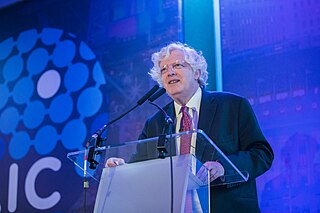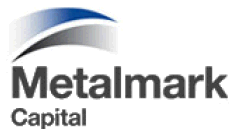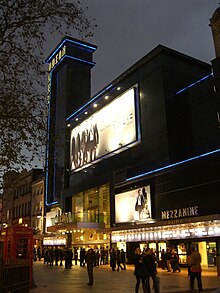
A leveraged buyout (LBO) is one company's acquisition of another company using a significant amount of borrowed money (leverage) to meet the cost of acquisition. The assets of the company being acquired are often used as collateral for the loans, along with the assets of the acquiring company. The use of debt, which normally has a lower cost of capital than equity, serves to reduce the overall cost of financing the acquisition. This is done at the risk of magnified cash flow losses should the acquisition perform poorly after the buyout.
The Carlyle Group Inc. is an American multinational company with operations in private equity, alternative asset management and financial services. As of 2023, the company had $426 billion of assets under management.
Private equity (PE) is stock in a private company that does not offer stock to the general public. In the field of finance, private equity is offered instead to specialized investment funds and limited partnerships that take an active role in the management and structuring of the companies. In casual usage, "private equity" can refer to these investment firms, rather than the companies in which that they invest.

Guy Hands is an English financier and investor. He is most notable as the founder and former chairman of Terra Firma Capital Partners, one of the largest private equity firms in Europe. Hands also was chairman of the UK music company EMI.
Bain Capital, LP is an American private investment firm based in Boston, Massachusetts, with around $185 billion of assets under management. It specializes in private equity, venture capital, credit, public equity, impact investing, life sciences, crypto, tech opportunities, partnership opportunities, special situations, and real estate. Bain Capital invests across a range of industry sectors and geographic regions. The firm was founded in 1984 by partners from the consulting firm Bain & Company. The company is headquartered at 200 Clarendon Street in Boston with 22 offices in North America, Europe, Asia, and Australia.
Goldman Sachs Asset Management Private Equity is the private equity arm of Goldman Sachs, focused on leveraged buyout and growth capital investments globally. The group, which is based in New York City, was founded in 1986.
In finance, the private-equity secondary market refers to the buying and selling of pre-existing investor commitments to private-equity and other alternative investment funds. Given the absence of established trading markets for these interests, the transfer of interests in private-equity funds as well as hedge funds can be more complex and labor-intensive.
Silver Lake, legally Silver Lake Technology Management, L.L.C., is an American global private equity firm focused on technology and technology-enabled investments. Silver Lake is headquartered in Silicon Valley and New York, and has offices in London, Hong Kong, and Singapore.

Apollo Global Management, Inc. is an American asset management firm that primarily invests in alternative assets. As of 2022, the company had $548 billion of assets under management, including $392 billion invested in credit, including mezzanine capital, hedge funds, non-performing loans, and collateralized loan obligations, $99 billion invested in private equity, and $46.2 billion invested in real assets, which includes real estate and infrastructure. The company invests money on behalf of pension funds, financial endowments, and sovereign wealth funds, as well as other institutional and individual investors.
AlpInvest Partners is a global private equity asset manager with over $85 billion of committed capital since inception as of December 31, 2022. The firm invests on behalf of more than 450 institutional investors from North America, Asia, Europe, South America and Africa.

CCMP Capital Advisors, LP is an American private equity investment firm that focuses on leveraged buyout and growth capital transactions. Formerly known as JP Morgan Partners, the investment professionals of JP Morgan Partners separated from JPMorgan Chase on July 31, 2006. CCMP has invested approximately $12 billion in leveraged buyout and growth capital transactions since inception. In 2007, CCMP was ranked #17 among the world's largest private equity funds.

The history of private equity, venture capital, and the development of these asset classes has occurred through a series of boom-and-bust cycles since the middle of the 20th century. Within the broader private equity industry, two distinct sub-industries, leveraged buyouts and venture capital experienced growth along parallel, although interrelated tracks.

Court Square Capital Partners is a private equity firm focused on leveraged buyout transactions. Court Square was originally a captive private equity firm within Citigroup known as Citigroup Venture Capital Equity Partners. Court Square's investment professionals have invested over $4.5 billion in more than 150 transactions, which have returned $14 billion to date.

Private equity in the 1990s relates to one of the major periods in the history of private equity and venture capital. Within the broader private equity industry, two distinct sub-industries, leveraged buyouts and venture capital, experienced growth along parallel although interrelated tracks.

Private equity in the 2000s represents one of the major growth periods in the history of private equity and venture capital. Within the broader private equity industry, two distinct sub-industries, leveraged buyouts and venture capital expanded along parallel and interrelated tracks.
MidOcean Partners is a New York–based alternative asset management firm that specializes in mid-sized private equity and alternative leveraged investments.
Castle Harlan is a private equity firm based in New York City. The company focuses on buyouts and growth capital investments in middle-market companies across a range of industries. Founded in 1987, Castle Harlan invests in controlling interests in middle-market companies in North America and Europe, Australia and Southeast Asia through Castle Harlan Australian Mezzanine Partners.

Metalmark Capital, formerly Morgan Stanley Capital Partners is a private equity firm focused on leveraged buyout investments in middle-market companies across a range of industries. Metalmark was acquired by Citigroup Alternative Investments in December 2007.
Global Infrastructure Partners (GIP) is an infrastructure investment fund making equity and selected debt investments. GIP's main headquarters are located in New York City and its equity investments are based on infrastructure assets in the energy, transport and water & waste sectors. GIP employs approximately 150 investment and operational professionals and has offices in New York, London, Stamford, Sydney, Melbourne, Brisbane, Mumbai, Delhi, Singapore and Hong Kong. In total as of 2023, its portfolio companies employ approximately 100,000 people, according to the company website. BlackRock acquired the company in 2024.
Tim John Robert Pryce is a British businessman and previous CEO of Terra Firma Capital Partners, a leading European private equity investment firm, and one of its founding members. Pryce is also on the board of the General Partners as well as part of Terra Firma's management committee. Pryce is reported to be the highest paid director at the firm.












